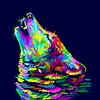You need to sign in or sign up before continuing.
Take a photo of a barcode or cover
The book is easy to read and flows well. However I found that the author uses not widely accepted theories to base his main arguments. Additionally, some of the points are seemingly contradictory, such as his views on science and religion.
challenging
informative
I wonderfully digestible read about physics, astronomy, maths, history, and the human spirit from Alan Lightman's perspective. Thought provoking and question inducing this book gets those brain synapsis firing.
A thinking person's book
I don't love to give five star ratings, but this is a book that makes you take a hard look at reality, both seem and unseen by the naked eye. It even brings us to the present day and how technology is altering our experiences. I find that to be profound given that none of it requires a higher power to work, dealing solely with the world around us. It doesn't r by the spiritual experience but makes it more of a metaphysical thing rather that something other. Great read.
I don't love to give five star ratings, but this is a book that makes you take a hard look at reality, both seem and unseen by the naked eye. It even brings us to the present day and how technology is altering our experiences. I find that to be profound given that none of it requires a higher power to work, dealing solely with the world around us. It doesn't r by the spiritual experience but makes it more of a metaphysical thing rather that something other. Great read.
A grab bag of ideas on the universe - its creation, its purpose, and our role in it. It is staccato - each chapter looks at the universe from a different perspective, not building on previous ideas. Some chapters are better than others. With each chapter being its own essay, Lightman is more convincing in some chapters over others making and supporting his point. However, the books shines when it needs to. Chapters on the creation of the universe and God’s role in the universe are exceptionally well written and thought-provoking.
“We are living in one of a cast number of universes. We are living in an accidental universe. We are living in a universe incalculable by science.”
Warning Nerdgirling :THAT WAS SERIOUSLY NERDGASMIC. The amounts of evens I can’t: so high it caused a systematic dysfunction.
I cannot explain my dysfunctional exuberance regarding this particular read, maybe it’s because I haven’t really read anything this beautifully simplified, or it’s because I was familiar with most of the theories mentioned there; the same physics and the same philosophical resonances that left me flabbergasted as a teenager Although each Higgs particle is far smaller than an atom, it takes colossal machine to find one
MIT physicist Alan Lightman (quite the storyteller) laid ahead humanity’s biggest ponderings, majestically —in his own words, of how we’re striving to paint, in and out our desperate escapades, the whole image of the universe we exist in. Stuck between fine-tuning conundrums and the devastating idea of the accidental existence, Alan resumes humanity to be teared up by its endeavor for order and symmetry yet its illogical attachment to faith in that lies beyond nature. Lightman is also a professor in humanities, he has his students fathom great architecture of pure logic by day, and venture in the extravaganza of human mind in the afternoons.
This duality makes Alan knit a most captivating literature.
He asks engrossing questions like: “Why do these fundamental parameters happen to lie within the range needed for life? Does the universe care about life?" And “Why does such fine-tuning occur?”, “Why can’t we live forever?” And We may not have a precise answer indeed.
To the serious bits.
For a theoretical physicist, simplifying the gist of human knowledge in that way would be equivalent to writing a children’s book, and this book had that eye-popping curiosity and the eagerness to keep flipping pages as a bed-time story would, it has starry canvas of scattering constellations and cosmic lights in colorful wallpapers Perhaps nature is being the painter when she occasionally violates complete symmetry with irregular coastlines and the amorphous shapes of clouds . There’s certain loops of excitement in a natgeo-like narrative that keeps you wanting: the end of the story. Expect there isn’t any, the scientist’s humility even with his most beloved passions abides him to assume uncertainty. That’s why I estimate scientists more than any other human demographic, mainly pertaining to how they manage to conceptualize the most intriguing theories— of which complex mathematics readers like me can never interpret into a tactful collection of essays like this one.Theoretical physicists are Platonists . And perhaps their biggest tragedy —and ours—is facing the infinite possibilities of a fortuitous occurrence, truths they so desperately try to fathom into one unified theory of everything, a complete set of laws to prove the science’s religion : the central doctrine of science.
The downing revelations mentioned in this book are quite ambiguous, yet I cannot emphasize how utterly beautiful they are. From the insanely infinitesimal period during which the Higgs Boson appears to the gargantuan amount of time it takes a ray of galactic beam to reach our telescopes, the universe’s enigmas will forever prompt new questions, and eager minds such as Alan Lightman will do well at explaining that enigmatic haze.
Warning Nerdgirling :THAT WAS SERIOUSLY NERDGASMIC. The amounts of evens I can’t: so high it caused a systematic dysfunction.
I cannot explain my dysfunctional exuberance regarding this particular read, maybe it’s because I haven’t really read anything this beautifully simplified, or it’s because I was familiar with most of the theories mentioned there; the same physics and the same philosophical resonances that left me flabbergasted as a teenager Although each Higgs particle is far smaller than an atom, it takes colossal machine to find one
MIT physicist Alan Lightman (quite the storyteller) laid ahead humanity’s biggest ponderings, majestically —in his own words, of how we’re striving to paint, in and out our desperate escapades, the whole image of the universe we exist in. Stuck between fine-tuning conundrums and the devastating idea of the accidental existence, Alan resumes humanity to be teared up by its endeavor for order and symmetry yet its illogical attachment to faith in that lies beyond nature. Lightman is also a professor in humanities, he has his students fathom great architecture of pure logic by day, and venture in the extravaganza of human mind in the afternoons.
This duality makes Alan knit a most captivating literature.
He asks engrossing questions like: “Why do these fundamental parameters happen to lie within the range needed for life? Does the universe care about life?" And “Why does such fine-tuning occur?”, “Why can’t we live forever?” And We may not have a precise answer indeed.
To the serious bits.
For a theoretical physicist, simplifying the gist of human knowledge in that way would be equivalent to writing a children’s book, and this book had that eye-popping curiosity and the eagerness to keep flipping pages as a bed-time story would, it has starry canvas of scattering constellations and cosmic lights in colorful wallpapers Perhaps nature is being the painter when she occasionally violates complete symmetry with irregular coastlines and the amorphous shapes of clouds . There’s certain loops of excitement in a natgeo-like narrative that keeps you wanting: the end of the story. Expect there isn’t any, the scientist’s humility even with his most beloved passions abides him to assume uncertainty. That’s why I estimate scientists more than any other human demographic, mainly pertaining to how they manage to conceptualize the most intriguing theories— of which complex mathematics readers like me can never interpret into a tactful collection of essays like this one.Theoretical physicists are Platonists . And perhaps their biggest tragedy —and ours—is facing the infinite possibilities of a fortuitous occurrence, truths they so desperately try to fathom into one unified theory of everything, a complete set of laws to prove the science’s religion : the central doctrine of science.
The downing revelations mentioned in this book are quite ambiguous, yet I cannot emphasize how utterly beautiful they are. From the insanely infinitesimal period during which the Higgs Boson appears to the gargantuan amount of time it takes a ray of galactic beam to reach our telescopes, the universe’s enigmas will forever prompt new questions, and eager minds such as Alan Lightman will do well at explaining that enigmatic haze.
Short but excellent. 2nd book from Lightman that I’ve read, really enjoy the way he thinks and perceives the world, nature, and universe.
A selection of assays on how great advances in physics impacted philosophy. I found it entertaining but it remained quite surface level, I did not really learn something new from this.
adventurous
challenging
informative
inspiring
mysterious
reflective
relaxing
fast-paced
informative
inspiring
reflective
medium-paced



